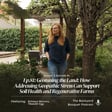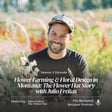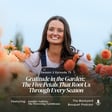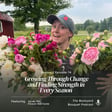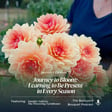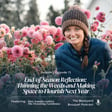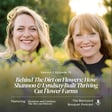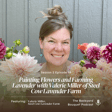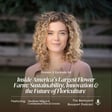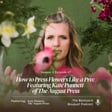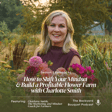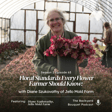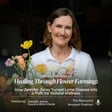
Ep. 65: From CSA to Advocacy: How Jenny Jonak of Dragon Song Farm Is Growing More Than Just Cut Flowers
In this episode of The Backyard Bouquet Podcast, host Jennifer Gulizia sits down with Jenny Jonak of Dragon Song Farm in Oregon’s Willamette Valley to explore how one flower farmer is blending sustainable flower farming, community-supported agriculture (CSA), and policy advocacy to create real impact.
Jenny shares how she grew her CSA flower farm from a few bouquets for friends into a thriving market business—and why she now champions water rights reform and land access for small farmers. We also dive into her innovative pressed flower jewelry, neurodivergent-friendly farm systems, and real-world tips for succeeding at farmers markets.
Whether you're a flower farmer, backyard grower, or passionate advocate for local agriculture, this episode is packed with practical wisdom and heartfelt perspective.
What You’ll Learn:
- How Jenny scaled Dragon Song Farm from a backyard garden to a full-time CSA and market farm
- Her journey as a neurodivergent farmer and systems that support her success
- Tips for creating high-impact farmers market bouquets (and maximizing cooler space!)
- The surprising legal hurdles small farms face around water rights in Oregon
- How pressed flower jewelry became a profitable and creative side of her farm business
Resources & Links Mentioned:
- Visit Jenny’s website: dragonsongfarm.com
- Follow Jenny on Instagram
- Learn more about the August Press for pressed flowers: https://www.theaugustpress.com/
- Explore Friends of Family Farmers – Oregon-based advocacy and resources: https://friendsoffamilyfarmers.org/
- Connect with NRCS (Natural Resources Conservation Service): https://www.nrcs.usda.gov/
- Learn about ASCFG – Association of Specialty Cut Flower Growers: https://www.ascfg.org/
🎙️ Tune in and discover how one woman is growing more than just flowers—she’s cultivating change.
Sign up for our newsletter: https://thefloweringfarmhouse.myflodesk.com/backyardbouquetpodcast
***Rate, Review, & Follow The Backyard Bouquet***
If you enjoyed this episode, will you please consider leaving the podcast a review? Your review helps make the podcast more discoverable to others and allows me to continue creating more episodes. I'd love to know what you enjoyed most about the episode.
New episodes every week to help keep your garden blooming!
